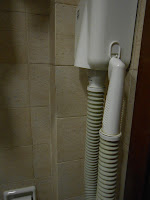Fontana di Trevi ~ Trevi Fountain
The Trevi fountain is the
largest Baroque fountain in
the city and one of the most famous fountains in the world. The fountain is at the junction of
three roads (tre vie) marks the
terminal point of the
"modern" Acqua Vergine, the revived Aqua Virgo, one of the ancient aqueducts that supplied water to ancient Rome.
The Roman custom of building
a handsome fountain at the endpoint of an aqueduct that brought water to Rome
was revived in the 15th century, with the Renaissance. In 1453, Pope
Nicholas V finished mending the Acqua Vergine aqueduct and built a
simple basin, designed by the humanist architect Leon Battista Alberti, to herald the water's arrival.
Taming of the
waters is the theme of the gigantic scheme that tumbles
forward, mixing water and rockwork, and filling the small square. Tritons guide Oceanus' shell chariot, taming hippocamps. In the centre a robustly-modeled triumphal arch is superimposed on the palazzo façade. The centre niche or exedra framing Oceanus has
free-standing columns for maximal light and shade. In the niches flanking
Oceanus, Abundance spills water
from her urn and Salubrity holds a cup from which a snake
drinks. Above, bas
reliefs illustrate the Roman origin of the aqueducts.
 |
| Side view |
 |
| Throwing my coin in |
 |
| Charla throwing her coin in |
 |
| Us throwing another coin in |
There is a famous tradition to stand with your back to the fountain and toss a coin over your shoulder (most common with right hand over left shoulder) into the water, thus ensuring your return to the Eternal City. On an average day, about €3,000 is thrown into the fountain.
We couldn't help but sit here for a while just staring at the magnificent fountain, that we decided to come back because I wanted Charla to see how it looked all lit up at night.
Pantheon
The Pantheon is a building commissioned
by Marcus Agrippa as a temple to all the gods of Ancient
Rome, and rebuilt by Emperor Hadrian in about 126 AD.
A rectangular vestibule links the porch to the rotunda, which is under a coffered, concrete dome, with a central opening (oculus) to the sky. Almost two thousand years after it was built,
the Pantheon's dome is still the world's largest unreinforced concrete dome.
It is one of the best-preserved of all Roman buildings. It has been in
continuous use throughout its history, and since the 7th century, the Pantheon
has been used as a Roman
Catholic Church dedicated to "St. Mary and the Martyrs" but
informally known as "Santa Maria della Rotonda."
Since the Renaissance, the
Pantheon has been used as a tomb. Among those buried there is painter Raphael,
as well as the first two Kings of Rome: Vittorio
Emanuele II and Umberto
I. The oculus is also the main source of light for the building, so it is only open when there is sunlight able to shine into it. (So it is not open very late during the winter months). The first time we came by the Pantheon is was closed because it was dusk and not light enough to be open, thankfully after the Vatican tour we had enough light still to go see it.
 |
| At dusk |
 |
| Oculus |
 |
| Vittorio Emanuele II's Tomb |
 |
| Raphael's Tomb |
After the Pantheon we were hungry again, and found a little Bakery that also served Brick-oven style pizza for €2 a slice so we ate there, and then decided we needed another gelato break.
This time we went to Giolitti.
Giolitti
"Rome's most famous gelateria keeps the hordes happy with succulent, natural-tasting sorbets and richer must-licks such as marrons glaces and hazelnut. Gregory Peck and Audrey Hepburn swung by in Roman Holiday. So naturally so did we on our Roman Holiday :)
 |
| Pistachio and chocolate with whipped cream |
 |
| Pistachio with whipped cream |
Monumento Nazionale a Vittorio Emanuele II~
National Monument to Victor Emmanuel II
Otherwise known as "Il
Vittoriano," it is
a monument built in honour of Victor Emmanuel, the first king of
a unified Italy. The monument holds the Tomb of the Unknown
Soldier with an eternal
flame, built under the statue of Italy after World War I following an idea of General
Giulio Douhet.
Almost every night we ended up walking down big shopping streets all lit up with Christmas light and decorated for the upcoming holiday. It was so beautiful!
Hotel Center 1,2,3
It was great to finally be able to have a trip where our bed wasn't a bus seat or bunk bed in a hostel, however the hotel was not the greatest. But we weren't going to complain too much since all we did was sleep and eat breakfast there. On the final night we were tired and just wanted to relax, and decided to find a place to buy a bottle of wine and go watch a movie back at our hotel. Which we did, but sadly the bottle ran out faster than the movie...way faster, hahaha.
It was a great ending to a great trip.
 |
Our awesome shower,
that gave you a back
massage |
 |
| super low powered hair dryer |
A few random photos
 |
| Plane back to Amsterdam |
 |
| Flying over the Alps |
And now (because I thought it would be fun) I had my mom scan me some photos from the last time I was in Rome to do a few comparison pics.
 |
| Vatican Museum Entrance |
 |
| St. Peter's Square |
 |
| St. Peter's Square |
 |
| St. Peter's Basilica |
 |
| A nasoni outside St. Peter's square |
 |
| Colosseum |
 |
| Roman Forum |
 |
| Piazza Navona |
 |
| Trevi Fountain |
Arrivederci Roma, until the next time...































































No comments:
Post a Comment